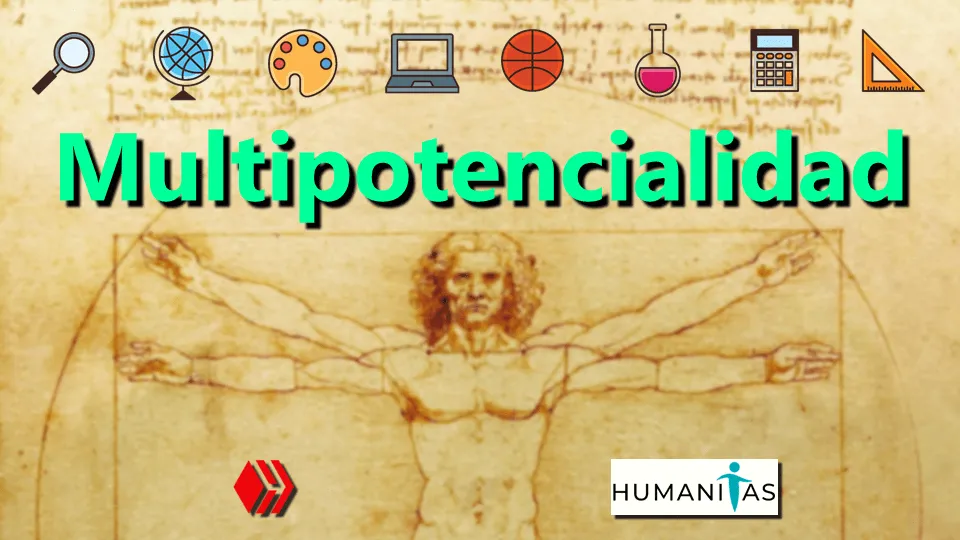Imagina que alguien como Leonardo Da Vinci es traido al mundo actual, y que, de pronto, se le exige o pide que para poder tener éxito sólo debe concentrarse en una sola cosa. Debe escoger entre la pintura, la ciencia, la ingeniería y la escultura. Es muy probable que, sea lo que Da Vinci escogiera, lo hubiera hecho muy bien, pero la pregunta es ¿Se convertiría en el mismo Da Vinci que conocemos según la historia? Yo diría que probablemente no, y ese es el tema que quiero traer a reflexión en esta publicación.

Recientemente, descubrí lo que es el concepto de personas con pensamiento multipotencial. Se trata de personas cuyo pensamiento y forma de vivir se basa en la curiosidad y el aprendizaje y aplicación de diversos conocimientos muchas veces muy diferentes entre sí. Esto me llamó mucho la atención, ya que aunque previamente tenía cierta noción al respecto, no estaba al tanto de que existía este concepto. Creo que siempre he tenido afinidad con este tipo de pensamiento, por lo cual tiendo a inclinarme por sentir curiosidad por temas que pueden ser muy diferentes entre sí. Los que me conocen saben que poseo 3 cuentas en Hive, cada una dedicada a ciertos nichos (las otras dos, por cierto, andan algo abandonadas).
Si eres una persona con este tipo de pensamiento, debes estar muy al tanto de la incomodidad que se siente cuando de alguna manera se te exige o pide que definas lo que se supone que será todo tu futuro, o gran parte de él, dedicado a una sola cosa o área. Por supuesto, no todas las personas de este tipo terminan siendo como Da Vinci, ya que no solo hay un lado positivo sino también contras. Son muy conocidas las frases "Mucho abarca, poco apreta" ó "Aprendiz de todo, maestro de nada", y no es un secreto que el exceso de focos puede generar ciertos problemas si no se gestionan bien.
Pero ¿De donde surge todo esto? Toda la información histórica apunta a que desde la revolución industrial la sociedad ha tendido a favorecer la especialización por sobre la "universalidad" de conocimientos. Hasta aquí todo muy bien, ya que la división del trabajo entre cada persona genera que los especialistas en algo sean recompensados por su trabajo especifico. Grandes avances en ciencia y desarrollo se han logrado de la mano de la especialización. El problema es que quizás no todas las personas están hechas o se sienten a gusto con ser "especialistas" o dedicarse a una sola cosa en menor mayor grado.
No se trata únicamente de tener intereses muy diferentes entre sí y aburrirse de alguno de ellos cuando ya se pierde la curiosidad. La multipotencialidad va mucho más allá cuando se toman dos cosas muy diferentes entre sí y se juntan para crear algo nuevo. Existe mucho pensamiento transversal y creatividad. Imagina que eres un matemático y también te interesa conocer la Biblia a fondo, pues probablemente luego tomes cada palabra o versículo y lo analices matemáticamente para encontrar patrones o cosas muy interesantes. Algo así probablemente hizo Isaac Newton, quien por cierto dedicó más hojas escritas a la espiritualidad y la religión que a la misma matemática y cálculo.
El humanismo se refiere a la universalidad o desarrollo del conocimiento humano de manera extensa, más practicado siglos atrás, en contraparte con la especialización que exige más el mundo moderno. No es casualidad que la educación actual haya heredado cierta influencia al incluir contenidos en diversas áreas, para luego especializarse en la educación superior. Sin embargo, la especialización también pareciera traer consigo cierta pérdida de creatividad y rigidez de pensamiento (a nivel general como sociedad). No es un secreto que millones de personas en todo el mundo se hartan de sus trabajos o aspiran a algo que los haga sentir "Que no trabajan". El video que les comparto arriba habla de una combinación ideal entre personas especialistas y personas multipotenciales para el éxito de una empresa.
Tampoco es un secreto que en el mundo actual ya no es suficiente con estudiar una carrera universitaria para asegurar tu futuro, por lo que ampliar los conocimientos y desarrollar nuevas habilidades se ha vuelto más importante. Sin haberlo deseado, estaríamos volviendo a la "desespecialización". Debemos aprender varias cosas para ganarnos la vida. El problema, quizás, es la manera de cambiar el paradigma, el aprender algo nuevo sin que genere ansiedad e incertidumbre.
Quizás la Web3 y estas nuevas filosofías en la información y comunidades pueda conllevar a una mayor "descentralización" de la especialización. Lo podemos ver en #Hive, en donde usuarios pueden desarrollar su lado más creativo, ese lado que es más libre de reglas externas. Nuestra marca personal va más allá de una profesión, de hecho, realmente me cuesta imaginar como alguien como, por ejemplo, Da Vinci, hubiera definido su marca personal según los paradigmas modernos, pero está claro que su marca personal no se basaría en un nicho, sino en una "filosofía". No se basaría en un nicho como la ingeniería, pintura o ciencia, sino en un "concepto" como la innovación, ingenio, "arte científica", o algo por el estilo, lo cual abarca más que un nicho particular.

Imagine that someone like Leonardo Da Vinci is brought into today's world, and suddenly he is required or asked to concentrate on one thing only in order to succeed. He must choose between painting, science, engineering, and sculpture. It is very likely that, whatever Da Vinci chose, he would have done very well, but the question is, would he become the same Da Vinci that we know from history? I would say probably not, and that is the topic I want to bring up in this publication.

Recently, I discovered the concept of people with multipotential thinking. These are people whose thinking and way of life are based on curiosity and the learning and application of diverse knowledge, many times very different from each other. This caught my attention because although I previously had some notion about it, I was not aware that this concept existed. I think I have always had an affinity for this type of thinking, so I tend to be inclined to be curious about subjects that can be very different from each other. Those who know me know that I have 3 accounts on Hive, each dedicated to certain niches (the other two, by the way, are somewhat abandoned).
If you are a person with this kind of thinking, you should be well aware of the discomfort felt when you are somehow required or asked to define what is supposed to be your entire future, or much of it, dedicated to a single thing or area. Of course, not all people of this type end up being like Da Vinci, as there is not only a positive side but also cons. It is no secret that too much focus can generate certain problems if not well managed.
But where does all this come from? All historical information points to the fact that since the Industrial Revolution, society has tended to favor specialization over the "universality" of knowledge. So far so good, since the division of labor among each person generates that specialists in something are rewarded for their specific work. Great advances in science and development have been achieved through specialization. The problem is that perhaps not all people are made or feel comfortable with being "specialists" or with dedicating themselves to only one thing to a lesser degree.
It is not just a matter of having very different interests and getting bored with one of them when curiosity is lost. Multipotentiality goes much further when you take two very different things and put them together to create something new. There is a lot of cross-disciplinary thinking and creativity. Imagine you are a mathematician and you are also interested in knowing the Bible in-depth, Well then you probably take every word or verse and analyze it mathematically to find patterns or very interesting things. Something like that probably did Isaac Newton, who by the way devoted more written pages to spirituality and religion than to mathematics and calculus itself.
Humanism refers to the universality or development of human knowledge in an extensive manner, more practiced centuries ago, as opposed to the specialization demanded by the modern world. It is no coincidence that current education has inherited a certain influence by including content in various areas and then specializing in higher education. However, specialization also seems to bring with it a certain loss of creativity and rigidity of thought (on a general level as a society). It is no secret that millions of people around the world are fed up with their jobs or aspire to something that makes them feel "that they don't work". The video I share above talks about an ideal combination of specialists and multi-potential people for the success of a company.
It is also no secret that in today's world, it is no longer enough to study for a university degree to secure your future, so expanding knowledge and developing new skills have become more important. Unwittingly, we would be returning to "de-specialization". We must learn several things to make a living. The problem, perhaps, is how to change the paradigm, how to learn something new without generating anxiety and uncertainty.
Perhaps Web3 and these new philosophies in information and communities can lead to a greater "decentralization" of specialization. We can see it in #Hive, where users can develop their more creative side, that side that is freer from external rules. Our personal brand goes beyond a profession, in fact, I really struggle to imagine how someone like, for example, Da Vinci, would have defined his personal brand according to modern paradigms, but it is clear that his personal brand would not be based on a niche, but on a "philosophy". It would not be based on a niche such as engineering, painting, or science, but on a "concept" such as innovation, ingenuity, "scientific art", or something like that, which encompasses more than a particular niche.
Translated to English language with the help of DeepL.com
Otras redes sociales:
 |
 |
 |

| ¡Gracias por visitar! — ¡Thanks for visiting!  |